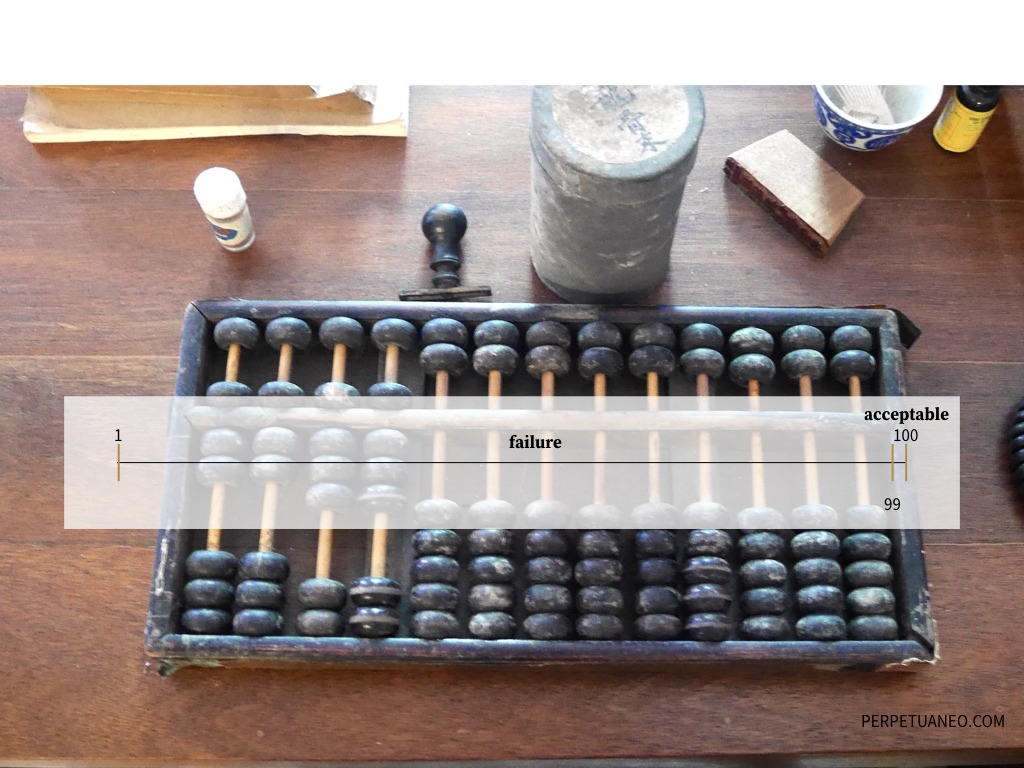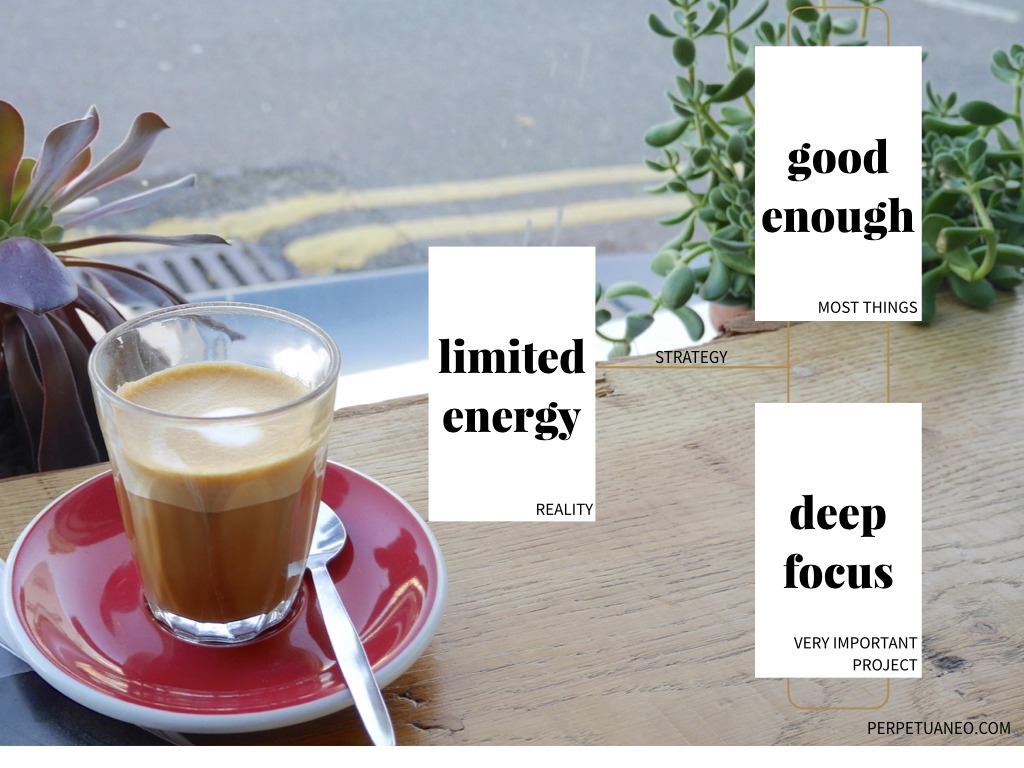We’d all be as productive and efficient as we envision if we were cyborgs. With no emotions and distractions to get in the way, things would get done. We could be perfect. Or at least until, consciousness and emotions evolve. Like in Blade Runner. Or Data in StarTrek. Yet, we seek being perfect like it’s the Holy Grail.
But really, perfectionism drives procrastination, rather than productivity. Perfectionism doesn’t create perfection. But some of us are unaware of our perfectionist personality. It’s often laced in words like “I have very high standards”, “I am not good enough”, and “There’s so many things I must live up to in X, Y, Z areas of my life”. Before reality hits. There’s not enough time. And we’re so overwhelmed.

The truth about Perfectionism
Perfectionism is creating exacting and impossible standards for yourself, across all parts of your life. It’s ticking off 90% of your growing to-do list, and getting furious for not finishing that 10%. Even if it’s minor tasks, but you don’t care. You discount the 90% . Perfectionism is being the mother who sends her children to 6 after-school activities a week and cooks them organic meals whilst running her business. She gets angry with herself that she didn’t tidy the toys in the playroom. . because she has a cold.
Success = Less Perfectionism, Less Procrastination
You lie awake excited about doing something, thinking it will be done (and perfect!) in 3 hours. Alas, logic never plays out as fantasised. Because you’re distracted by tweaking the font size, ‘just adding in that bit of information’, and keyed up when nothing much’s been done in 2 hours. The thought of making any mistake or having any shortcoming is so painful, it sends you to tick every checkbox and create more. That’s how you procrastinate. Then you miss deadlines and do a shoddy job. Because worrying steals your brain power and stops you from solving problems. You hate the outcome, and you’re angry with yourself. You’ve had enough of this vicious cycle across your life. And you ask, how to not procrastinate anymore? How to be successful? Here are two things to think about.
Meet: Good Enough
Most people who strive for perfection believe that’s how great things and outcomes come about. That’s true sometimes, but this black-and-white approach does not apply to all parts of life. In reality, life operates on something else.
- Silicon Valley firms release ‘minimum viable products’ that are deemed to meet some basic standards. They improve their products after public release. Version 1.0, 2.0, 3.0 etcetera. Otherwise they’d be tinkering away and tweaking till kingdom come. And we’d never know what an iPhone is.
- Firms, governments and people can’t digest all information available to make perfect decisions and actions. Too much information; too little brain power and time. Thus they are ‘satisfied’ by what will ‘suffice’ (Satisficing; not utility-maximising unlike what economic assumptions say).
- Bloggers, students writing dissertations and authors suffer from the Perfect myth before finally hitting ‘publish’. But I remind them, “You can’t squeeze everything about this gargantuan topic in 20000 words.” That’s why we have volumes on subtopics, and new editions all the time.
In other words, it’s about being Good Enough. The tension between letting go and doing your best, that’s the secret sauce in how to be successful. And often we miss out and procrastinate because we don’t sit back and define what is ‘good enough’ before we begin.
Before beginning a project, ask yourself:–
- “What standards are Good Enough for this project?”
- To focus: “Which bits are absolutely essential that I can devote most of my focus to, and which parts can I spend less time on?”
NOTE: Write it out, don’t just dream it up, and don’t spend ten hours on Phase Zero.(Spend 20 minutes). Trust yourself. (Because people who worry and procrastinate have great problem-solving skills, they just don’t have faith in their skills. . and they’re not aware that this lack of faith is what blocks them).
With a concrete plan, you’ve created momentum.
Can you apply these ideas to other parts of your life?
- If you’re unsure which decisions you can apply the ‘Good Enough’ rule to, ask,” how minor is this decision I am are making? What’s the worst that could happen?”
- If it’s pretty trivial, like deciding on which brand of salt (and I’m assuming you’re not a chef here) to buy, then let it go.
- Make some mistakes, have a laugh at these. Life will be much more enjoyable and peaceful.
Bottomline is, where can you compromise, so you can stop worrying, and start the ball rolling.
So you can focus your energy to create prodigious outcomes
Why do I emphasise being ‘good enough’? Three reasons. (a) You’re aware of the beliefs that have been driving you on autopilot. You can now make decisions based on the kind of life you really want to live. And you’re empowered because this life becomes more authentic. (b) You can cut down the worrying. (c) You have much more brainpower and energy for the projects and causes you want to be astounding.
There are parts of your life you need perfection in. Like if you’re a brain surgeon, your patients’ lives hinges on your skills. Not your shampoo brand. And then there are parts of your life that you may like to create something artisanal in. Which requires practise.

A Chanel 2.55 handbag requires 6-15 skilled artisans working away over 18 hours. It takes at least 3000 hours of deliberate practice to become a chess grandmaster, that is if you have certain factors working for you. Like innate talent, special practice techniques and early starting age. Otherwise, some never reach master status even after practising 25000 hours. Have you ever bitten into a slice of bread, and marvelled at the gorgeousness of its taste? I have. I was at Hartnett Holder & Co, run by Michelin-starred chefs, and our server told us that the exquisite sourdough loaf was made from a two-year starter with a secret century-old recipe. Years and years of perfecting in the making to create a slightly treacly and burnt-toffee taste. To me, these examples answer the question of “how to be successful”.
Beautiful, prodigious outcomes like that take time and energy. Which are facilitated if distractions and unnecessary brainpower stealers are kept to a minimum.
Want way more time and energy? Then it’s time to master your mind and yourself, especially if you have High-Functioning Anxiety– book your free Chemistry Call here.





